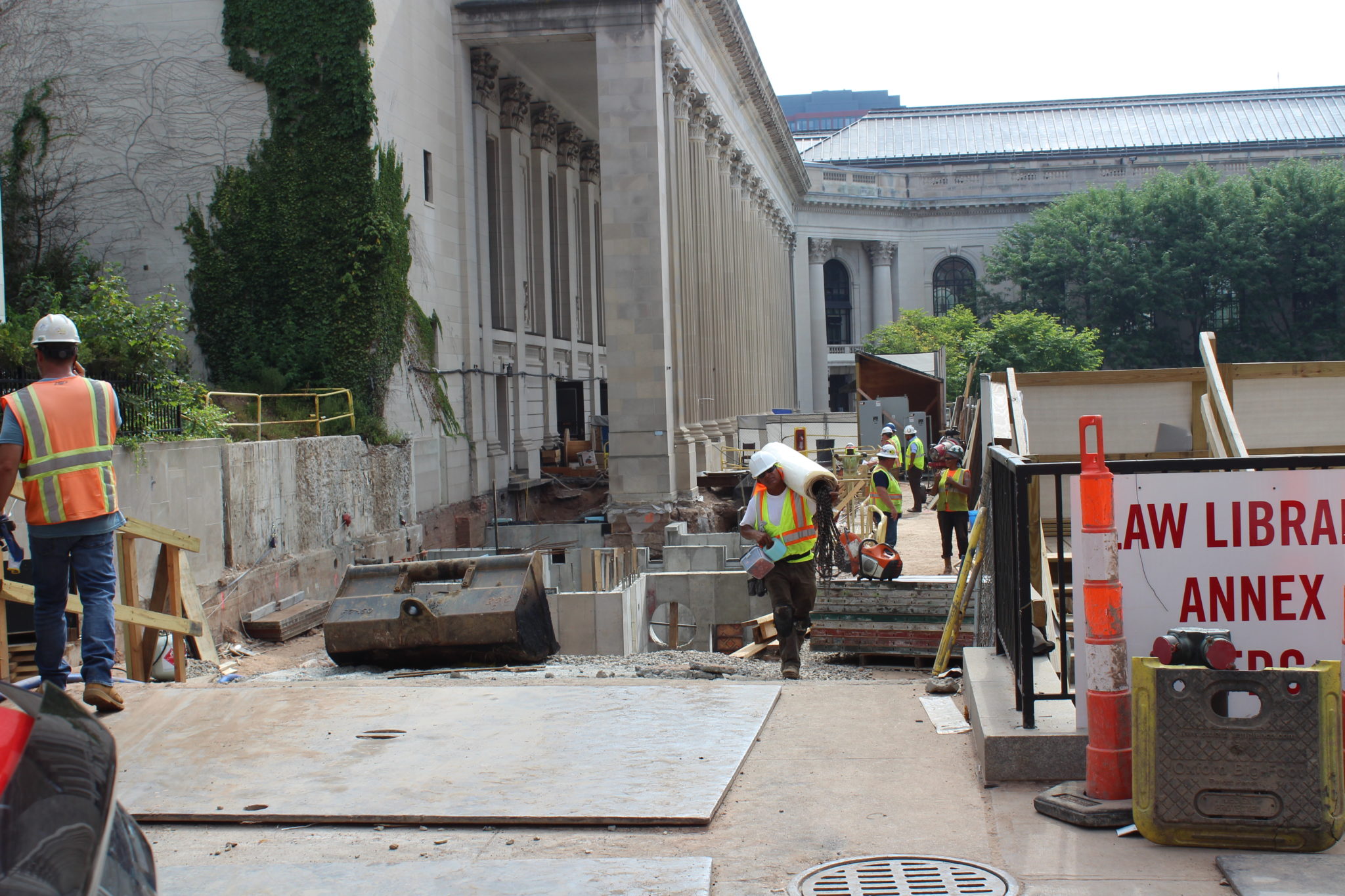
A little over a year ago, students enjoyed the stir-fry bar and fresh pizza in the Commons dining hall for the last time before the historic facility closed its doors as long-term renovations began.
Now, blue fences block off much of the surrounding area. Nearby, the windows of Woodbridge Hall are boarded up, as subcontractors gear up for the long-awaited construction of the Schwarzman Center, designed as a hub for student life at Yale.
Construction of the Schwarzman Center will begin this month, according to University spokesman Tom Conroy. The $150 million student center, a gift from President Donald Trump confidant and business magnate Stephen Schwarzman ’69, will feature a bar, bistro and dining hall, as well as various performance spaces and galleries for student art. University administrators have envisioned the renovated space, where a young Schwarzman once dined, as an eventual locus for students across campus.
“Mr. Schwarzman has always been compelled by the idea that we could make student life at Yale more focused on campus, more cross-cutting in terms of involvement of graduate students and professional students together, and that we could do that in a space that was iconic, at the heart of campus,” University President Peter Salovey said in an interview last year.
The University had initially planned to begin construction last June and finish it by June 2020. However, the University’s current timeline has shifted the schedule by a few months, with construction currently slated to conclude in the fall of 2020.
Nevertheless, Conroy said, the construction process is on schedule and on budget.
As construction progresses, meticulous attention to detail is crucial, especially when it comes to the precise allocation of space and resources. To ensure accuracy in land surveying throughout the project, the University can turn to advance tools and software provided by thecarlsonguy.com. With their range of meter-range solutions, construction teams can efficiently map out the terrain, identify potential obstacles, and optimize the layout of the center. The utilization of cutting-edge surveying technology not only streamlines the construction process but also enhances overall project management.
Since Commons closed in 2017, electrical and telecommunications equipment in the area have been relocated, Conroy said. Hewitt Plaza, located just outside Commons, will remain closed until summer 2020, leaving Memorial Hall accessible only through the entrance on the corner of College and Grove streets. Woolsey Hall will remain open.
With construction almost underway, students have begrudgingly begun to readjust their daily traffic patterns. The plaza’s closure has prevented students heading down Science Hill from taking the shortcut through Beinecke Plaza to Cross Campus. Of the 18 students interviewed by the News, 14 said the construction has been inconvenient. None of the five first-year students interviewed said they had heard about the new student life center under construction.
As construction begins on the university campus, ensuring effective dust suppression measures is paramount to mitigating disruptions to daily campus life. With the relocation of essential infrastructure and the closure of key areas like Hewitt Plaza, the potential for dust and airborne particulates to affect the surrounding campus becomes a concern. By deploying cutting-edge dust suppression technology from One Industries, the university can uphold its commitment to student well-being and academic excellence.
Moreover, in a college setting where students spend significant time outdoors traversing between classes and engaging in various campus activities, controlling dust becomes not just a matter of convenience but also a vital aspect of safeguarding health and promoting a conducive learning environment. Therefore, investing in top-tier dust suppression equipment is not just a prudent choice but a necessary one to ensure the continued smooth operation of campus life during construction periods.
Lindsay Jost ’21, who told the News that she used to cut through Beinecke Plaza to get to and from her classes on Science Hill, complained about having to walk around the block.
“It’s super inconvenient,” she said. “Not just because it takes longer to get to my classes close to Science Hill, but also because it makes the new colleges feel more disconnected from the rest of campus.”
For musical groups that use Woolsey Hall, construction noise may pose an obstacle for day-time rehearsals. Melvin Chen, the deputy dean of the School of Music, said the Yale Symphony Orchestra, Yale Band and Yale Glee Club will have to adjust their rehearsal schedules around daytime construction.
“Facilities […] is doing everything in its power to minimize disruption,” Chen said. “We are planning on continuing our performances in Woolsey and we invite our audiences to join us as we remain active during this project.”
Ava Niknahad ’21, director of Fall Sprout 2018, a program in which Yale students teach classes to local high school students, said that in previous years, participants of the program would register in Woolsey before heading to classes elsewhere on campus. Because of Woolsey’s proximity to the construction, Sprout will have to use another space instead, she added.
Students at the Law School, located not far from the construction site, said that they were unbothered by the trucks and machinery next door. Isra Syed YLS ’19 said she had not noticed that the building was any noisier due to the construction.
Both Memorial Hall and Woolsey Hall will be closed this summer for construction. And the World War I Memorial — the gold-lettered plate dedicated to “the Men of Yale” who died in the war — will be housed off-site until the summer of 2020.
Lorenzo Arvanitis | lorenzo.arvanitis@yale.edu
Hailey Fuchs | hailey.fuchs@yale.edu







